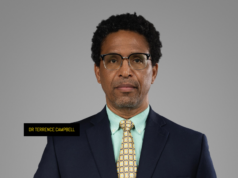Dear Editor,
What began two weeks ago as a family outing to a public place, gruesomely transformed into a national tragedy that ripped apart the social fabric of this dear land of ours. It forced the majority of the Guyanese polity to seriously call into question, some of the norms that many may have come to take for granted.
Within less than 24 hours, an innocent and pleasant occurrence of a private nature, became a galvanising force for the majority of right-thinking Guyanese at home, within the Disapora – and indeed, the world at large. The unfortunate and depressingly sad passing of Adriana Younge is first and foremost a painfully personal matter for her family. Yet, the reality is that her initial disappearance at the Double Day Hotel on Wednesday April 23, 2025, and the ensuing sequence of acts and omissions that culminated in her life being callously snuffed out – and indeed the events thereafter – lead to a regrettable conclusion: that there are resultant foundational issues of national importance that arise from Adriana’s tragic demise, which to date have not been acknowledged. And to be clear, these issues do not extend to the antics of opportunists and attention-grabbers eager to sensationalise a personal tragedy as a rallying cause for their narrow personal (or even political) gain.
A vivid example of this larger concern pertains to the detention of the driver of the infamous Raum motor car, on the basis of the patently false premise that Adriana had exited the hotel premises and boarded that car. It is reported that the driver was stopped the next morning at the Harbour bridge, had allegations of two serious offences put to him, which he denied, and then taken to the La Grange station and detained. Hindsight tells us that the detention, from the inception, was unlawful; but one has to give the benefit of the doubt to the two ranks who would have been responding to clear instructions emanating from their superior(s). It was not until later in the evening that the driver was released; we are told that the whole contrived scenario will lead to the driver suing somebody for defamation.
But while the offence of defamation would likely be of more concern to the driver, there are larger, more far-reaching issues that should interest the nation as a whole. The Guyana Constitution provides protection for all law-abiding citizens; as a consequence, their expectation must be at all times – absent any illegality on their part, or special or emergency circumstances prevailing at any particular point in time – that they can rely on such protection, and the protection of responsible organs of the state – in this case the Police – to respect the Constitution and more specifically, their fundamental rights and freedoms as laid down therein.
Article 139 of the Guyana Constitution affords protection to all Guyanese for the right to personal liberty and a person can only be deprived of this right, in circumstances such as these, ‘upon reasonable suspicion of his [sic.] or her having committed…a criminal offence…’. As stated earlier, when the driver of the Raum was intercepted at the Harbour Bridge, he had committed no offence and so he should not have been deprived of his personal liberty. Even if the police officers were dutifully carrying out instructions, it certainly is the case that by mid-morning when the gruesome discovery of Adriana’s body was made, his detention thereafter became patently illegal. It was thereafter a matter of false imprisonment, if the pretext for said detention, as put to him by the female officer at the Harbour Bridge, was that he had allegedly abducted her.
Article 148 of the Guyana Constitution affords protection for the right to freedom of movement. This is a right to which any citizen is entitled to unfettered enjoyment, whether they are in a public space, on a roadway, approaching the Harbour bridge – wherever. However one’s freedom of movement can be restricted for the purpose of ‘lawful detention’; based on the above, it is pellucid that the driver’s detention was unlawful either from the outset, or certainly from around mid-morning on the day in question (it has since been reported that a constitutional motion has been filed on behalf of the driver).
The most fundamental of all the rights due to Guyanese citizens which deserves full and complete protection is of course the right to life; this right is given primordial importance as the first provision in the Fundamental Rights clauses in Article 138. The cynics may seek to apportion some responsibility for Adriana’s demise on the adults who were supervising her on that fateful day; however the circumstances under which she went missing and was subsequently discovered lifeless almost twenty-four hours after not having left that commercial property, place the primary responsibility for this reprehensible deprivation of her right to life squarely at the feet of the proprietor.
There is arguably also a residual responsibility upon law enforcement – as organs of the State – for their lapses in response, the fictitious yarn about Adriana’s departure from the hotel, and dereliction of their duty to diligently and expeditiously pursue the missing person’s report – all of which cumulatively would have contributed to her sad loss of life.
The persons who are the most directly affected by this incredulous recent sequence of events are undoubtedly Adriana’s parents Subrian and Amecia and her immediate family.
With the mix of emotions all wrapped up and weighing down on them right now, Article 149D of the Guyana Constitution would no doubt be of interest and relevance to them. This provision states that no person shall be denied equality or equal protection of the law. It is patent that law enforcement provided differential treatment to the proprietor of the Double Day Hotel and was deceptive, misleading and unprofessional when it came to addressing the Younge family’s needs and concerns. This is especially so in circumstances where it involved the ultimate deprivation of the life of a loved one; this situation of unequal protection of the law is not one in which any Guyanese would want to find either themselves and/or their family.
Given that the Guyana Constitution affords protection to all citizens, it is not unreasonable to expect that the owner of the Double Day Hotel might seek to have his rights also protected. Article 143 of the Guyana Constitution provides protection to citizens against arbitrary search of ‘his or her or property’ or ‘the entry by others on his or her premises’. It should be noted however that the operative word is ‘arbitrary’; thus, besides this right being subject to the consent of the person, it is also not a contravention if a search or entry is conducted ‘under the authority of any law’ and is ‘reasonably required in the interest of …public safety, public order, public morality…’.
A key aspect in the manner in which the sequence of events unfolded at the Double Day Hotel was as regards the prolonged delay to which the family was subjected – in circumstances where it would be an understatement to say that time was of the essence – to comprehensively search the premises after it was conclusively determined that Adriana was missing. Hence the protection that might otherwise have been afforded to the hotel’s proprietor in this specific instance is limited and subject to express conditions pertaining to upholding the lawful authority of the police. Astonishingly this latter authority was not exercised on this occasion, to the detriment and distress of the family of Adriana Younge and the ultimate demise of this adolescent child.
Further, a groundswell of opinion has been expressed in defence of the right to protest; indeed I have noted that some soidisant leaders have publicly advocated for the protest to continue (does that bestow upon them the role of leader, organizer, instigator…?). Let the record show that the Guyana Constitution is silent as regards this so-called “right to protest”, be it peaceful or otherwise.
Rather, Article 147 refers to the ‘freedom…of demonstration’. Significantly, this provision is cast as a freedom, not a right: more importantly, the language employed by the framers of the Constitution is ‘freedom to demonstrate peacefully’; no doubt for emphasis and effect, the phrase ‘demonstrate peacefully’ is repeated. Additionally, this freedom is not absolute and its enjoyment can be circumscribed by the consent of the individual(s).
I leave it to the objective observer, and ultimately the Court, to determine whether or not what transpired outside the GPHC on Monday 28 April 2025, in the immediate after lunch period, and subsequently there and at several other locations across coastal Guyana, amounted to a peaceful demonstration. In the words of KN the next day, ‘[W]hat began as a peaceful demonstration in support of justice for 11-year-old Adriana Younge quickly descended into chaos….’
In my humble estimation, there is no clear demarcation or time-stamp when situations like this move from being a peaceful demonstration, to becoming protest, lawlessness, violence, attacks and assault, looting, malicious damage to property, arson and such other illegal activity. As a consequence, it would be instructive for those who have raised their hand in support of the continuation of this amorphous “right to protest”, to make clear for what specific purpose they are allegedly “standing with the scrapes”.
I would hope for the sake of our democracy that it is around the freedom to demonstrate peacefully in Article 147 that they wish to coalesce and associate themselves. If such be the case, I challenge them to explain what checks and balances they would (be willing to) employ, to prevent peaceful demonstration from descending into chaos, as KN put it.
Not to be overlooked, the so-called “scrapes” can also seek protection from the provisions of the Guyana Constitution.
In this regard, on 29 April 2025 the Guyana Police Force let it be known that persons who were charged for inciting public terror would be ‘placed on a no-flight list, and their personal information and other particulars will be shared with regional and international law enforcement agencies’. It should be noted that the evidentiary threshold for securing the charge of inciting public terror is relatively high, and also that Article 144 of the Constitution on the protection of the law for citizens, includes the presumption of innocent until proven guilty.
Additionally, whereas Article 139 of the Constitution protects one’s right to personal liberty, such right can be curtailed ‘upon reasonable suspicion of his [sic.] or her having committed…a criminal offence.…’ The question to be answered therefore is whether these recent arrests for inciting public terror, based primarily it would seem on the review of video footage, fall under the qualification of ‘reasonable suspicion’, thereby allowing for the protection afforded by Article 139 to be curtailed.
Again, the freedom of movement protected under Article 148 of the Constitution includes ‘the right to leave Guyana’. This right can be restricted upon the ‘lawful detention’ of the person. To the extent that many of these persons are not under ‘lawful detention’ but only the subject of a wanted notice, can their ‘right to leave Guyana’ also be curtailed?
In what would appear to be somewhat of a contradiction, persons are being ‘placed on a no-flight list and their personal information and other particulars will be shared with regional and international law enforcement agencies’ at the same time! But, if the intention is to keep these wanted persons within this jurisdiction, why share information with law enforcement counterparts in other jurisdictions? Is this an acknowledgment of the porous nature of our borders, or some sort of anticipated systems failure at our ports of exit? Should the ‘personal information and other particulars’ of the proprietor of the Double Day Hotel be similarly shared regionally and internationally, applying the same logic as with those accused of inciting public terror?
Suffice to say that for the range of fundamental rights and freedoms provided in the Guyana Constitution, similar in scope to the other Constitutions of the Commonwealth Caribbean, there is adequate provision for redress in Article 153, in situations where the aforementioned rights and freedoms are prohibited.
What then is the takeaway, the lessons that could be gleaned from this sorry concatenation of circumstances catalouged above? It is imperative that all Guyanese are made aware of these extant fundamental rights and freedoms for which they can seek protection and shelter under the umbrella of the Constitution. Likewise, they must also be equally aware of what corresponding obligations attend these rights and that they must be enjoyed responsibly. This idea would seem to resonate with the announcement last Thursday by Vice-President Jagdeo that Civics would now be thought as a compulsory course in schools, albeit in a more focused way. Our people need to be properly sensitized on these fundamental issues as a matter of course.
Taking a whole of government approach, H.E. the President should expeditiously establish a Task Force, ideally chaired by the Hon. Attorney General and comprising his Ministerial colleagues from Home Affairs, Health, Education, Human Services, Information and the National Security Adviser, with technical advice from the GPF and DPI. Beyond that, civil society at the level of the Guyana Human Rights Association (name and nature), academia, religious groups, representatives of the private sector and the United Nations Office in Guyana could serve as valuable collaborators and interlocutors.
The aim would be to compile information, take statements and hold consultations with a view to presenting a Green Paper to Cabinet. This would form the basis of a Strategy and Plan of Action to give life and meaning to what already exists in our Constitution, but sadly may be currently lost on our populace.
Guyana should not have had to wait for a tragedy of such immense proportions to spring into action – indeed, reaction – to let the citizenry know where they stand in terms of constitutional protection for their fundamental rights and freedoms. Adriana Younge’s disappearance and the resultant death and other sordid events should never happen again. May Her Innocent Soul Rest in Eternal Peace.
Yours respectfully,
Neville Bissember













